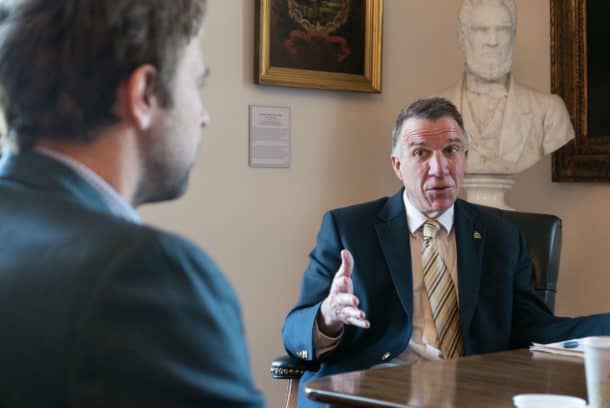
By Kit Norton and Xander Landen/VTDigger
The Vermont Senate voted Tuesday to override Gov. Phil Scott’s veto of the Global Warming Solutions Act — legislation that legally requires the state to meet targets for reducing carbon emissions in the coming years. Since the House had already voted to override the veto, the measure is now law.
Without debating or discussing the legislation, the Democratic-controlled Senate swiftly voted 22-8 to reverse Scott’s decision, meeting the two-thirds majority needed to override a gubernatorial veto.
The House overrode Scott’s veto 103-47 last week.
The Global Warming Solutions Act, H.688, requires the state to reduce greenhouse gas pollution to 26% below 2005 levels by 2025. Emissions would need to be 40% below 1990 levels by 2030 and 80% below by 2050.
If the government fails to meet these goals, the bill allows individuals to sue the state, to force it into compliance.
During Tuesday’s vote, the six Republicans in the Senate and two Democrats — Sens. Bobby Starr and John Rodgers of Essex/Orleans — voted to affirm the governor’s veto, while the rest of the upper chamber voted to override it.
While the legislation sets up new emissions reduction requirements, it does not spell out or dictate how the state will meet them. Instead, it forms a 23-member Climate Council — with the governor’s secretary of administration acting as the chair, and other members including state government officials, representatives from the manufacturing sector, citizen experts and others — to come up with a pollution reduction plan.
Throughout the legislative process, Scott and his administration signaled they were uncomfortable with the prospect of opening up the state to lawsuits if it does not meet emissions goals.
The governor sent a letter to legislative leaders on Aug. 12, outlining his concerns and the changes he would like in the bill. In that letter and in his Sept. 15 veto message, Scott said he agrees that the state must address climate change.
“I share the Legislature’s commitment to reducing greenhouse gas emissions and enhancing the resilience of Vermont’s infrastructure and landscape in the face of a changing climate,” Scott said.
“H.688, as written, will lead to inefficient spending and long, costly court battles, not the tangible investments in climate-resilient infrastructure, and affordable weatherization and clean transportation options, that Vermonters need,” he said.
Scott worries that the plan could lead to costly litigation for the state, that the Climate Council creates an “unconstitutional separation of powers” and that the bill does not include a “process ensuring the Legislature would formally vote” on a climate action plan.
It would be up to the Agency of Natural Resources to adopt new rules to regulate greenhouse gas pollutants by the following year after the Climate Council completed its plan.
After Scott vetoed the bill, Democratic leaders said they would act quickly to override the governor.
“The governor has said he believes Vermont should meet the goals set out in the Paris climate agreement, and rightly gets favorable headlines when he does,” Senate President Pro Tem Tim Ashe said last week. “But these goals don’t just meet themselves. You need to take action. To have a plan.”
In the last decade, other states — including Connecticut, New Jersey, Massachusetts and Maine — have enacted similar legislation requiring them to cut emissions in the coming decades.
As Vermont’s emissions have increased in recent years — with the most recent data from 2016 showing emissions 13% above 1990 levels — Democratic lawmakers made passing the Global Warming Solutions Act a priority heading into the 2020 session.



